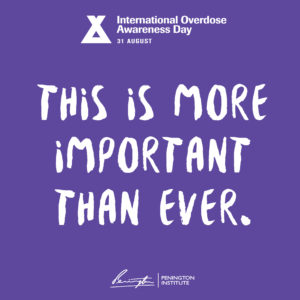2021 International Overdose Awareness Day
The 2000 National Household Survey on Drug Abuse found that in the U.S. among full-time workers aged 18 – 49, 1 in 13 reported past month illicit drug use. Drug abuse and overdose affect more than just the addicted person. Over 26 percent of employed adults have substance abuse or addiction in their families. Over 42 percent of these employees felt their productivity suffer as a result.
August 31st is International Overdose Awareness Day and was initiated in 2001 by Sally J Finn at The Salvation Army in St Kilda, Melbourne. Since 2001, many community members, as well as government and non-government organizations, have held events to raise awareness and commemorate those who have been lost to a drug overdose.
International Overdose Awareness Day is the world’s largest annual campaign to end overdose, remember without stigma those who have died, and acknowledge the grief of the family and friends left behind.
The campaign raises awareness of overdose, which is one of the world’s worst public health crises and stimulates action and discussion about evidence-based overdose prevention and drug policy.
The campaign acknowledges the profound grief felt by families and friends whose loved ones have died or suffered permanent injury from a drug overdose.
International Overdose Awareness Day spreads the message about the tragedy of drug overdose death and that drug overdose is preventable.
The goals of International Overdose Awareness Day are:
- To provide an opportunity for people to publicly mourn loved ones in a safe environment, some for the first time without feeling guilt or shame.
- To include the greatest number of people in International Overdose Awareness Day events, and encourage non-denominational involvement.
- To give community members information about the issue of fatal and non-fatal overdose.
- To send a strong message to current and former people who use drugs that they are valued.
- To stimulate discussion about overdose prevention and drug policy.
- To provide basic information on the range of support services that are available.
- To prevent and reduce drug-related harm by supporting evidence-based policy and practice.
- To inform people around the world about the risk of overdose.
Let’s work together to get everyone the support they need. Not currently an MBWCF member – click here to learn more about how to join!

